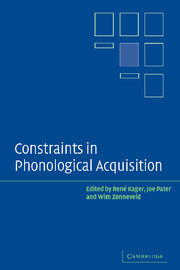Book contents
- Frontmatter
- Contents
- List of contributors
- Abbreviations
- Preface
- 1 Introduction: constraints in phonological acquisition
- 2 Saving the baby: making sure that old data survive new theories
- 3 Markedness and faithfulness constraints in child phonology
- 4 Input elaboration, head faithfulness, and evidence for representation in the acquisition of left-edge clusters in West Germanic
- 5 Phonological acquisition in Optimality Theory: the early stages
- 6 Syllable types in cross-linguistic and developmental grammars
- 7 Bridging the gap between receptive and productive development with minimally violable constraints
- 8 Learning phonotactic distributions
- 9 Emergence of Universal Grammar in foreign word adaptations
- 10 The initial and final states: theoretical implications and experimental explorations of Richness of the Base
- 11 Child word stress competence: an experimental approach
- Index of subjects
- Index of names
1 - Introduction: constraints in phonological acquisition
Published online by Cambridge University Press: 22 September 2009
- Frontmatter
- Contents
- List of contributors
- Abbreviations
- Preface
- 1 Introduction: constraints in phonological acquisition
- 2 Saving the baby: making sure that old data survive new theories
- 3 Markedness and faithfulness constraints in child phonology
- 4 Input elaboration, head faithfulness, and evidence for representation in the acquisition of left-edge clusters in West Germanic
- 5 Phonological acquisition in Optimality Theory: the early stages
- 6 Syllable types in cross-linguistic and developmental grammars
- 7 Bridging the gap between receptive and productive development with minimally violable constraints
- 8 Learning phonotactic distributions
- 9 Emergence of Universal Grammar in foreign word adaptations
- 10 The initial and final states: theoretical implications and experimental explorations of Richness of the Base
- 11 Child word stress competence: an experimental approach
- Index of subjects
- Index of names
Summary
This volume presents ten studies in phonological first language acquisition, an area of research that has become one of fast-growing importance in recent years. The reason for this is not just the fruitfulness and linguistic interest of this type of study per se: it is also the case that the more we come to know about phonological development, by the analysis of growing numbers of data collections and increasingly sophisticated experiments, the more the field has complied with the notion that acquisition research lies at the heart of the modern study of language. One of the aims of this introduction is to illustrate and discuss these developments. In line with them, the past decade in phonology in particular has witnessed an upswell of productive interaction between empirical acquisition research and theory development. With the arrival and rise of constraint-based models, in particular Prince and Smolensky's (1993) Optimality Theory, phonological theory now provides a framework that meets the desiderata expressed more than two decades ago by Lise Menn (1980: 35–36), who is also a contributor to this volume:
… The child's ‘tonguetiedness’, that overwhelming reality which Stampe and Jakobson both tried to capture with their respective formal structures, could be handled more felicitously if one represented the heavy articulatory limitations of the child by the formal device of output constraints […] The child's gradual mastery of articulation then is formalized as a relaxation of those constraints.
Information
- Type
- Chapter
- Information
- Constraints in Phonological Acquisition , pp. 1 - 53Publisher: Cambridge University PressPrint publication year: 2004
Accessibility standard: Unknown
Why this information is here
This section outlines the accessibility features of this content - including support for screen readers, full keyboard navigation and high-contrast display options. This may not be relevant for you.Accessibility Information
- 1
- Cited by
